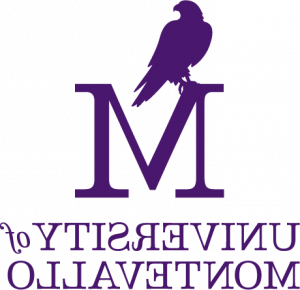Keshia McClantoc, UM ‘17
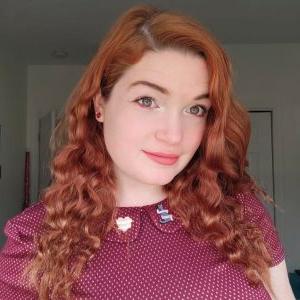 The professors at UM always modeled a type of student-centered teaching that made me feel deeply cared for during my time at Montevallo, and it’s the type of care that I bring to my own classrooms as I teach now. Even though I graduated UM years ago, I still keep in contact with many of these same professors.
The professors at UM always modeled a type of student-centered teaching that made me feel deeply cared for during my time at Montevallo, and it’s the type of care that I bring to my own classrooms as I teach now. Even though I graduated UM years ago, I still keep in contact with many of these same professors.
Some favorite memories that come to mind are attending the Sigma Tau Delta Conference, working at the Harbert Writing Center, and just taking so many incredibly niche classes — like Dr. Rozelle’s sci-fi or horror classes, different iterations of Dr. Mahaffey’s New Orleans’ class, or classes about working in the archives.
You can apply the English major to so many different goals. Myself and the friends I made during my time in the major are certainly proof of it — some of them have become lawyers, some are working for newspapers, and others (like me) are pursuing graduate school. Still others are working in publishing companies, some are high school or middle school teachers, and some are working on video game development. It’s a major that will give you the critical skills to see the world through whatever possibilities you can imagine.
Tell us about your current role:
I am a PhD Candidate/Graduate Student in English (with a focus on Composition & Rhetoric as well as Women & Gender Studies) at the University of Nebraska-Lincoln. In this role. I take graduate level classes and work as a Teaching Assistant at UNL, where I teach introductory writing courses. I am currently writing my dissertation and will be seeking out a job as professor in the coming year as I graduate.
How did the English program at UM prepare you for life after college?
As I’ve been in graduate school since finishing UM, earning an MA degree in 2019 and with a plan to finish up my PhD in 2024, I haven’t really had a time “after college” yet. In that regard, the English program prepared by giving me full support in my graduate school goals. This included mentorship through undergraduate research projects that taught me the value of research, writing, and designing scholarly work around my own interests. The professors at UM always modeled a type of student-centered teaching that made me feel deeply cared for during my time at Montevallo, and it’s the type of care that I bring to my own classrooms as I teach now. Even though I graduated UM years ago, I still keep in contact with many of these same professors, who support me in large and small ways, as I work through my academic journey.
What is your favorite memory from your time at UM?
I have so many incredible memories from my time in the UM English Department. Some favorite memories that come to mind are attending the Sigma Tau Delta Conference, working at the Harbert Writing Center, and just taking so many incredibly niche classes — like Dr. Rozelle’s sci-fi or horror classes, different iterations of Dr. Mahaffey’s New Orleans’ class, or classes about working in the archives. But if I really had to pick one moment it would be when Dr. Chandler (a former UM teacher) found out I got into both of my top-choice graduate schools and literally jumped up and down with me in the hallway. It was incredible to have someone I looked up to so much share that joy with me.
What advice would you give students considering an English major at UM?
The biggest advice I would give someone considering an English major at UM is that it truly is one of those majors that you can apply to so many different goals. Myself and the friends I made during my time in the major are certainly proof of it — some of them have become lawyers, some are working for newspapers, and others (like me) are pursuing graduate school. Still others are working in publishing companies, some are high school or middle school teachers, and some are working on video game development. It’s a major that will give you the critical skills to see the world through whatever possibilities you can imagine into it.
Madison Jones, UM ‘10
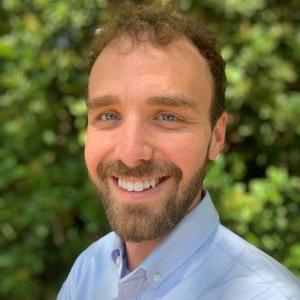 I am an Assistant Professor with a dual appointment in the departments of Writing & Rhetoric and Natural Resources Science at the University of Rhode Island where I serve as a Senior Fellow at the Coastal Institute and direct the DWELL Lab. UM prepared me for everything I do today, namely by encouraging me to develop a creative identity and a diverse skillset driven by interdisciplinary inquiry. From the craft of writing, argumentation, and research to being open to new possibilities, I gained so much from my time at Montevallo. The English major opens up so many possibilities for your career and intellectual development. It is a stepping stone toward rich possibilities. Further, learning to appreciate the craft of writing is like entering another world. The lessons I have taken from studying and discussing books have sustained me through the best and worst times in my life.
I am an Assistant Professor with a dual appointment in the departments of Writing & Rhetoric and Natural Resources Science at the University of Rhode Island where I serve as a Senior Fellow at the Coastal Institute and direct the DWELL Lab. UM prepared me for everything I do today, namely by encouraging me to develop a creative identity and a diverse skillset driven by interdisciplinary inquiry. From the craft of writing, argumentation, and research to being open to new possibilities, I gained so much from my time at Montevallo. The English major opens up so many possibilities for your career and intellectual development. It is a stepping stone toward rich possibilities. Further, learning to appreciate the craft of writing is like entering another world. The lessons I have taken from studying and discussing books have sustained me through the best and worst times in my life.
What is your current role?
I am an Assistant Professor with a dual appointment in the departments of Writing & Rhetoric and Natural Resources Science at the University of Rhode Island where I serve as a Senior Fellow at the Coastal Institute and direct the DWELL Lab. I research science through social and historical perspectives, teach courses on science writing and environmental advocacy, and practice community-engagement with science using location-based technologies (e.g.—augmented reality and digital maps) as well as apply creative and digital/visual approaches to science and environmental communication. My research intersects place-based writing and digital rhetoric to understand how locative media provide new possibilities for environmental advocacy and science storytelling.
How did the English program at UM prepare you for life after college?
UM prepared me for everything I do today, namely by encouraging me to develop a creative identity and a diverse skillset driven by interdisciplinary inquiry. From the craft of writing, argumentation, and research to being open to new possibilities, I gained so much from my time at Montevallo.
What is a favorite memory from your time at UM?
My favorite memory (among the many happy memories I have of UM) was the day I met my wife Jane (another UM English alum). I was leaving the campus bookstore and struggling to balance a pile of books against my chin (no doubt for my English classes). It must have been quite the spectacle because she noticed me and laughed. When I saw her, I nearly dropped the whole stack. The rest, as they say, is history. We welcomed our first child, Catherine Anne, this past August.
What advice would you give students considering an English major at UM?
Do it! The English major opens up so many possibilities for your career and intellectual development. It is a stepping stone toward rich possibilities. Further, learning to appreciate the craft of writing is like entering another world. The lessons I have taken from studying and discussing books have sustained me through the best and worst times in my life.
Madison Griggs, UM ‘17
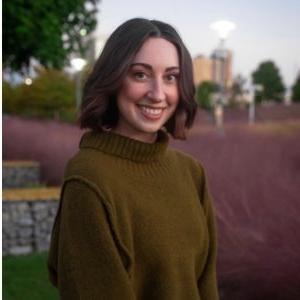 I am an independent artist and freelance writer for a marketing firm. My typical day consists of writing blogs for a variety of different clients, making art, managing my online print and sticker shop, and creating art-related content for social media. UM’s English major made me a better writer, and I write almost every day so it’s had a huge impact. But being an English major also gave me a greater sense of empathy and understanding for people I’ll never know, as well as a deeper understanding of myself through my own writing. Communication may be a soft skill, but it’s one of the few skills that’s necessary in just about any job you can think of.
I am an independent artist and freelance writer for a marketing firm. My typical day consists of writing blogs for a variety of different clients, making art, managing my online print and sticker shop, and creating art-related content for social media. UM’s English major made me a better writer, and I write almost every day so it’s had a huge impact. But being an English major also gave me a greater sense of empathy and understanding for people I’ll never know, as well as a deeper understanding of myself through my own writing. Communication may be a soft skill, but it’s one of the few skills that’s necessary in just about any job you can think of.
Don’t be afraid to think outside of the box when it comes to career choices—the skills you’re going to learn as a UM English major will help you wherever you end up. Whether you decide to teach, work in marketing, or something completely different, having the ability to see things from different perspectives and communicate your thoughts clearly will take you far.
When did you graduate? What was your major/minor? Extracurricular activities?
I graduated December of 2017. For most of my time at UM I worked on The Alabamian as a writer and as copyeditor!
What is a favorite memory from your time at UM?
I loved all of the editing nights we had for The Alabamian. We’d stay up obscenely late to get everything ready to go, eat junk food, and watch ridiculous videos. Those nights always had big “deliriously funny sleepover” vibes and I loved it.
What English course was most influential for you?
I took a summer class called Writing About Place where we dove into literature surrounding the Alabama Black Belt. Because it was a summer course, we got to take trips around the area and learned so much about its history and Southern Black culture. We got to see some incredible art and learned so much about the present-day ramifications of slavery in the South. It was eye-opening.
What is your current position, and what does a typical day look like?
I am an independent artist and freelance writer for a marketing firm. My typical day consists of writing blogs for a variety of different clients, making art, managing my online print and sticker shop, and creating art-related content for social media.
How would you say the English major at UM prepared you for life after college? For your current position?
The obvious answer is that UM’s English major made me a better writer, and I write almost every day so it’s had a huge impact.
The less obvious answer is that reading and writing are some of the best things you can do to get to know yourself and others. Being an English major gave me a greater sense of empathy and understanding for people I’ll never know, as well as a deeper understanding of myself through my own writing. Empathy is essential—in writing, in art, and in life.
Being an English major also further encouraged my love of reading, which makes its way into a lot of my art today.
What advice would you give potential English majors, or students wondering about English at UM?
Communication may be a soft skill, but it’s one of the few skills that’s necessary in just about any job you can think of. Don’t be afraid to think outside of the box when it comes to career choices—the skills you’re going to learn as a UM English major will help you wherever you end up. Whether you decide to teach, work in marketing, or something completely different, having the ability to see things from different perspectives and communicate your thoughts clearly will take you far.
Jennifer Kelly UM ‘98
 From my freshman Honors class to my final seminar course, my classes as an English major took me from a fledgling academic writer with limited high school experience but ample will to learn and molded me into a writer that understood the task placed in front of her. I could take on a different interpretation of a text and develop the argument to sufficiently show the validity of my thoughts.
From my freshman Honors class to my final seminar course, my classes as an English major took me from a fledgling academic writer with limited high school experience but ample will to learn and molded me into a writer that understood the task placed in front of her. I could take on a different interpretation of a text and develop the argument to sufficiently show the validity of my thoughts.
My favorite memories of my time there include working on the Tower literary magazine, a group of us sifting through the piles of submissions from our classmates and arguing over which ones should be included in the next edition; my Sigma Tau Delta initiation, where I was able to join the honors society that I was later president of; and the fundraiser for the Tower that we had on Shakespeare’s birthday, where contributors from the university’s president to our professors to our classmates read their favorite poems and other pieces in support of the campus’s literary magazine.
Tell us about your current role.
Currently, I am a freelance writer, copyeditor, and author focusing on the sport of horse racing. I write for outlets like TwinSpires Edge, America’s Best Racing, and the Racing Biz and have contributed to publications like BloodHorse and Trainer magazines. I also have two books out, Sir Barton and the Making of the Triple Crown (2019) and The Foxes of Belair: Gallant Fox, Omaha, and the Quest for the Triple Crown (2023), both published by the University Press of Kentucky.
How did the English program at UM prepare you for life after college?
As a double major in English and French, I learned quite a bit about managing my time and my workload. I learned how to balance what I needed to accomplish for the work I had committed to and what I needed to do to care for myself. The faculty and staff I worked with helped me understand what I expected from myself and from the education I was giving and instilled in me the confidence to tackle the next thing and the next thing, no matter how big a challenge I was taking on.
From my freshman Honors class to my final seminar course, my classes as an English major took me from a fledgling academic writer with limited high school experience but ample will to learn and molded me into a writer that understood the task placed in front of her. I could take on a different interpretation of a text and develop the argument to sufficiently show the validity of my thoughts; I also had the experience necessary to take two different versions of the one story and discuss the differences between the two as well as interpret the meaning behind those differences.
Additionally, the faculty I worked with inspired me to teach as well. I pursued my M.A. after my time at Montevallo and then spent a decade in a college classroom teaching courses that ranged first-year writing to business and technical writing to upper underclassmen. I credit that time in the classroom with helping me take my skills as a writer to another level and preparing me to take on the task of writing two books.
What is a favorite memory from your time at UM?
My four years at Montevallo left me with quite a few memories of the place I considered my first true home. I loved living in the dorms, walking the beautiful brick streets, and playing College Night with my fellow Purples. My favorite memories of my time there include working on the Tower literary magazine, a group of us sifting through the piles of submissions from our classmates and arguing over which ones should be included in the next edition; my Sigma Tau Delta initiation, where I was able to join the honors society that I was later president of; and the fundraiser for the Tower that we had on Shakespeare’s birthday, where contributors from the university’s president to our professors to our classmates read their favorite poems and other pieces in support of the campus’s literary magazine.
Elizabeth Gassel Perkins, Campus President and Chief Academic Officer at Saint Louis Community College-Florissant Valley, B.A. ’04, M.A. ‘05
 I currently serve as the Campus President and Chief Academic Officer for St. Louis Community College-Florissant Valley. In my role, I’m responsible for the academic affairs functions on the campus (courses, programs, faculty), but I’m also responsible for several district-wide programs and college initiatives that exist on all or many of our campuses.
I currently serve as the Campus President and Chief Academic Officer for St. Louis Community College-Florissant Valley. In my role, I’m responsible for the academic affairs functions on the campus (courses, programs, faculty), but I’m also responsible for several district-wide programs and college initiatives that exist on all or many of our campuses.
UM gave me my love for higher education and provided me with more opportunities than I could have ever dreamed. Without the opportunity to serve as a Writing Center tutor, I don’t know that I would have found my passion for teaching. Without the opportunity to serve as an adjunct for a year, I would not have known just how much I love teaching. By being able to serve in SGA, Sigma Kappa Delta, and as a student representative on different college committees, I found my love for all things administrative in nature. My time at UM gave me project management skills and gave me greater capacity for empathy and sympathy. My studies challenged me to think differently and to consider perspectives, experiences, and opinions outside of my own. I am a better leader—and a better person—because of my professors and my fellow students.
What is your current role?
I currently serve as the Campus President and Chief Academic Officer for St. Louis Community College-Florissant Valley. In my role, I’m responsible for the academic affairs functions on the campus (courses, programs, faculty), but I’m also responsible for several district-wide programs and college initiatives that exist on all or many of our campuses. I am the district-wide CAO for all of our college’s high school programs (dual credit, early college, etc.) and our campus child care centers (we are opening another new center in the next two months), and I serve as the leader of our prison education programs, our developmental education programs, and course placement work. In addition to serving as the lead academic officer over the art and general transfer programs at the Florissant Valley campus, I am the Chief Academic Officer district-wide for all of our deaf communication programs, child and family development program, engineering and engineering technology programs, and our foreign language and first year experience courses.
I’m also responsible for the campus as a whole. We are currently in the process of building two new 100,000 square-foot buildings, demolishing some older buildings, and renovating existing buildings. It’s such an exciting time to be at the college! I will say that nothing in my education could have prepared me directly for dealing with the challenges of aggressive geese, old sewer lines, consistent power outages, or reading blueprints, but what I learned at Montevallo regarding collaboration, communication, and organization have all helped me in these areas, too.
How did the English program at UM prepare you for life after college?
Without Montevallo, my life would have been dramatically different than it is today. UM gave me my love for higher education and provided me with more opportunities than I could have ever dreamed. Without the opportunity to serve as a Writing Center tutor, I don’t know that I would have found my passion for teaching. Without the opportunity to serve as an adjunct for a year, I would not have known just how much I love teaching. By being able to serve in SGA, Sigma Kappa Delta, and as a student representative on different college committees, I found my love for all things administrative in nature. My time at UM gave me project management skills, gave me proficiency levels in Word and Excel (thanks to my MIS 161 course), and gave me greater capacity for empathy and sympathy. Beyond just the skills I learned for my career, my studies in English, political science, and sociology challenged me to think differently and to consider perspectives, experiences, and opinions outside of my own. I am a better leader—and a better person—because of my professors and my fellow students.
What advice would you give students considering an English major at UM?
The English major can prepare you for so many different paths. Take advantage of different class offerings to find out where your passions and talents exist in your first couple of years. I do highly recommend that everyone take more than one course that is specific to writing, grammar, structure, rhetoric, etc. Those were the courses that have made me the most employable in a variety of fields. Because of the great instruction I received in these courses, I have been able to help my students understand how to better their writing and have been able to add value to committee, taskforces, and other groups through my writing and editing skills. I also encourage all students—not just English majors—to get involved on campus in as many ways as you can.
Sara Crippen English B.A. with Professional Writing Minor ‘23, Ph.D. Candidate, Florida State
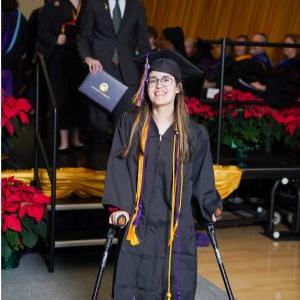 UM’s English program exposed me to a wide variety of genres, both fiction and nonfiction, which has prepared me to tackle all sorts of writing in and out of the workplace. My time in the English program taught me not only to write well, but to revise well and make my work the best it can be. The English department at UM is a close-knit community, and I will always treasure the friends I made there.
UM’s English program exposed me to a wide variety of genres, both fiction and nonfiction, which has prepared me to tackle all sorts of writing in and out of the workplace. My time in the English program taught me not only to write well, but to revise well and make my work the best it can be. The English department at UM is a close-knit community, and I will always treasure the friends I made there.
What is your current role?
I’m a master’s student in Florida State University’s Rhetoric and Composition program. I hold an assistantship position, so I work in the writing center and teach first year composition in exchange for a tuition waver and a stipend.
How did the English program at UM prepare you for life after college?
UM’s English program exposed me to a wide variety of genres, both fiction and nonfiction, which has prepared me to tackle all sorts of writing in and out of the workplace. My time in the English program taught me not only to write well, but to revise well and make my work the best it can be.
What is a favorite memory from your time at UM?
I have so many fond memories of time spent in Farmer Hall with the other English majors, joking around and swapping papers and talking about life. The English department at UM is a close-knit community, and I will always treasure the friends I made there.
What advice would you give students considering an English major at UM?
Take full advantage of your professors. Don’t be afraid to come to them for help or advice. They genuinely care about their students, and they’ll do everything they can to help you succeed personally and professionally if you just reach out to them.
Tina Moziel Braziel B.A. ’95, Poet and Director of Ada Long Creative Writing Workshop
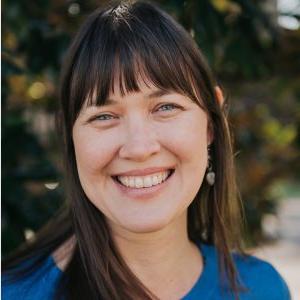
Photo credit: “Bang Images”
As a poet, I have many roles. I am the author of Known by Salt (Anhinga Press), winner of the Philip Levine Prize for Poetry, and Rooted by Thirst(Porkbelly Press). As the Alabama Poetry Delegate for central-east Alabama, I work with the Alabama River Alliance to organize eco-poetry workshops and to feature local poets and their poetry in the Southern Exposure Films.
What I love most about the English major is how it invites so much other knowledge in. If you know something about geology or philosophy or pottery, it informs how you write creativity, rhetorically, and analytically. Since we can’t ever know all the things (at least I know I can’t), English is a major that rewards us for following our curiosity. Take full advantage of UM’s liberal arts education. Take classes in whatever sparks your imagination. And talk with your professors about their passions. They may ignite your own.
What is your current role?
As a poet, I have many roles. I am the author of Known by Salt (Anhinga Press), winner of the Philip Levine Prize for Poetry, and Rooted by Thirst (Porkbelly Press). I am co-writing a collection of poems with my husband James Braziel about how we are building a glass cabin by hand while we live in it. This collection will be published by Pulley Press in 2024. I also direct the Ada Long Creative Writing Workshop for high school students and consult for the Magic City Poetry Festival. I teach poetry writing sessions along Alabama’s waterways, at the SPARK Writing Festival, and for various writing conferences. As the Alabama Poetry Delegate for central-east Alabama, I work with the Alabama River Alliance to organize eco-poetry workshops and to feature local poets and their poetry in the Southern Exposure Films.
Preparation after College:
Bill Cobb’s creative writing class inspired me to write more poetry and to give feedback to others. I most treasured his infectious enthusiasm for writing. Even after I graduated, hearing Bill read at a writing conference would always make me eager to read and write more. Since many of the English courses I took were cross-listed as Intercultural Studies courses, they prepared me to approach other cultures with the curiosity and respect they deserve.
Favorite Memory:
It is difficult to narrow it down to just one memory. I loved playing hide and seek in Orr Park. And I’ll never forget sculpting sandstone with Lonnie Holley in Charlotte Blackmon’s Art and Culture Class. He told us a story about each of our sculptures. I want to tell you why missing Maya Angelou read at Comer Auditorium is a favorite memory. While my friends and I were hiking at Falling Rock, busloads of people from all over the state came early and filled the auditorium to or beyond capacity. When we returned from our hike, there wasn’t room for us. When the organizers saw how many students missed out, they arranged for Maya Angelou to speak with us for a few minutes in Main Hall. I appreciated their thoughtfulness. And I was thrilled that Maya Angelou not only talked with us, she took the time to give each of us a hug.
Advice:
What I love most about the English major is how it invites so much other knowledge in. If you know something about geology or philosophy or pottery, it informs how you write creativity, rhetorically, and analytically. Since we can’t ever know all the things (at least I know I can’t), English is a major that rewards us for following our curiosity. That’s my advice. Take full advantage of UM’s liberal arts education. Take classes in whatever sparks your imagination. And talk with your professors about their passions. They may ignite your own.
Kayla Johnson B.A. ‘19
Tell us about your current role.
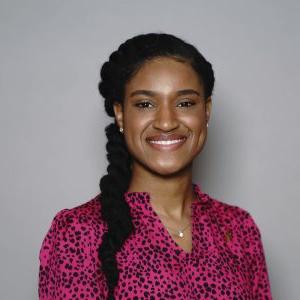 I am currently the new Instruction & User Experience Librarian and Assistant Professor at the University of Montevallo. Much of what I do varies each day, which I personally enjoy; it keeps things fresh and exciting for me. However, there are some things that are constant. Instruction is a major facet of what I do each week. I teach several classes, mostly working with English composition courses, instructing students on how to navigate the library’s databases and other resources. As an assistant professor, I am expected to engage in scholarly research, so I seek opportunities to contribute useful knowledge to my field and to collaborate with colleagues on research projects.
I am currently the new Instruction & User Experience Librarian and Assistant Professor at the University of Montevallo. Much of what I do varies each day, which I personally enjoy; it keeps things fresh and exciting for me. However, there are some things that are constant. Instruction is a major facet of what I do each week. I teach several classes, mostly working with English composition courses, instructing students on how to navigate the library’s databases and other resources. As an assistant professor, I am expected to engage in scholarly research, so I seek opportunities to contribute useful knowledge to my field and to collaborate with colleagues on research projects.
How did the English program at UM prepare you for life after college?
I owe much of my success to caring faculty members in the UM English & World Languages department. Not only did they help me in the classroom, but they made themselves available outside of the classroom, going beyond what was required of them. When I didn’t have a textbook, I had a professor who scanned chapters of the book for me. When I didn’t understand the material or a grade I received, I spoke with my professors who gave me valuable feedback. When I ran out of money to complete my degree, I had professors who submitted my name for scholarships, and I was able to receive emergency assistance. Because they cared, I was able to stay in school to complete my English degree, and I later received a full-ride scholarship to graduate school at the University of Alabama.
What is a favorite memory from your time at UM?
I went on a field trip in the African American Literature class. The course was taught by Dr. Alex Beringer that year and he brought along Carey Heatherly, the University Archivist. On the field trip, we visited unmarked gravesites of African Americans who died or were killed in Montevallo, learned about the convict-leasing system and about the culture of the times which allowed for the system to remain in effect for decades, legalizing the form of neo-slavery. What I learned on that trip shook me to my core and I was able to feel for a moment what times were like for those people.
What advice would you give students considering an English major at UM?
My advice to any student considering an English major at UM is to go for it! People would sometimes try to discourage me from getting an English degree, arguing that you “can’t do much with it,” but I have found that to be far from true. You can use the degree toward several career paths and make a good living for yourself.
